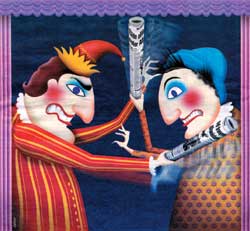 After the restoration of democracy in 1990, we have seen in Nepal an explosion of expression. In fact, if there is a single pillar of democracy that we can say is relatively robust, it is the media. The Panchayat-era taboos are gone, there are a very few holy cows left, and the freedom to publish and broadcast a wide spectrum of political opinion has bestowed on our adolescent democracy a remarkable resilience.
After the restoration of democracy in 1990, we have seen in Nepal an explosion of expression. In fact, if there is a single pillar of democracy that we can say is relatively robust, it is the media. The Panchayat-era taboos are gone, there are a very few holy cows left, and the freedom to publish and broadcast a wide spectrum of political opinion has bestowed on our adolescent democracy a remarkable resilience. Freedom is a safety valve that makes our polity less brittle, society itself more malleable. Outwardly, it is easy to mistake this freedom for a free-for-all, and the powerful who are in the media glare would prefer to get on with dealing in the shadows. But those who have personally profited from democracy and have in the process given the system a bad name must realise that it is, paradoxically, this same freedom that protects their interests.
It is only because all shades of opinion are allowed to be aired in public that tension and resentment do not fester. A free press allows Nepali society to let off steam. There are very few places in the world where an underground party committed to a violent overthrow of the state is allowed to openly own and publish a slew of newspapers. Where else would guerrilla leaders also be columnists for mainstream papers?
A vibrant media has reinforced the public sphere, it has made the citizenry more alert, it has fostered awareness and cemented Nepali society with a collective consciousness. Production quality, values, content, and the sheer range of public opinion makes the Nepali media today unrecognisable from what it was pre-1990. The deregulation and corporatisation of the Nepali media in the past 12 years have been driven by a simple fact: professionalism and credibility sell better than bias and gossip.
All this should have meant that media should have grown on a healthy trajectory. Alas, it hasn't. Traditional news values push the media to focus on confrontation and conflict, on the shallow and negative, the sensational and titillating. The media then sets off a self-perpetuating cycle of cynicism that hurts national morale and self-esteem.
There is now a bandwagon effect in the Nepali daily broadsheet market with at least five papers scrambling for a share of the pie. The FM business in the Valley is saturated. Television is the next frontier, and the unseemly wheeling and dealing that has accompanied the license for private cable TV shows that it must be very lucrative for all concerned. There is a similar fracas for licenses for terrestrial television.
The electro-magnetic spectrum is the property of the Nepali people, it does not belong to the minister of the day, it does not belong to private interests in perpetuity even if it is awarded by a passing politician. There must be anti-trust legislation to prevent the concentration of multi-media ownership in the hands of private
monopolies.
The imminent arrival of a fourth English daily in Kathmandu as an Indian joint-venture has raised nationalistic hackles. Why should we allow Indians to enter our media market when India itself has banned foreign ownership of media, they ask. They will influence our public opinion and dictate our national policy, others fume. It is interesting to reflect on what this says about the Nepali media's own self-confidence, and how fragile we think our nationalism is. If this is how weak we are, then we probably deserve some solid competition.
C'mon, let's grow up. Why do we weaken ourselves with paranoia? Let's build instead on our strengths, and one of them is a media that is at the moment the freest in the region.
Media is traditionally too lazy for introspection. Besides, daily deadline pressures don't give us time to take a step back and look at ourselves in perspective. If we did, we'd see that journalism is much more than being a passive recorder of events. Our role goes beyond the ego fill of a byline in tomorrow morning's newspaper.
For their part, media owners have to see their products as something much more important than the bottom line. There is a responsibility here that comes from carrying out a public service: the service of informing, interpreting and explaining independently, objectively and without a hidden agenda. It is about creating outrage about injustice, blowing the whistle on wrongdoers. And this will not happen if we are so swamped with the immediate, with the over-riding desire to please political patrons or the market.
At a time when hopelessness and helplessness abound, when there is yearning for a vision that will unite the crushed fragments of our nation, we owe it to ourselves and the Nepali people to restore trust, find faith, and protect our freedom with its complete application.
There is a lot that is wrong with Nepal, but we are not doomed. In these jaded times, media is also in the business of replenishing hope.


